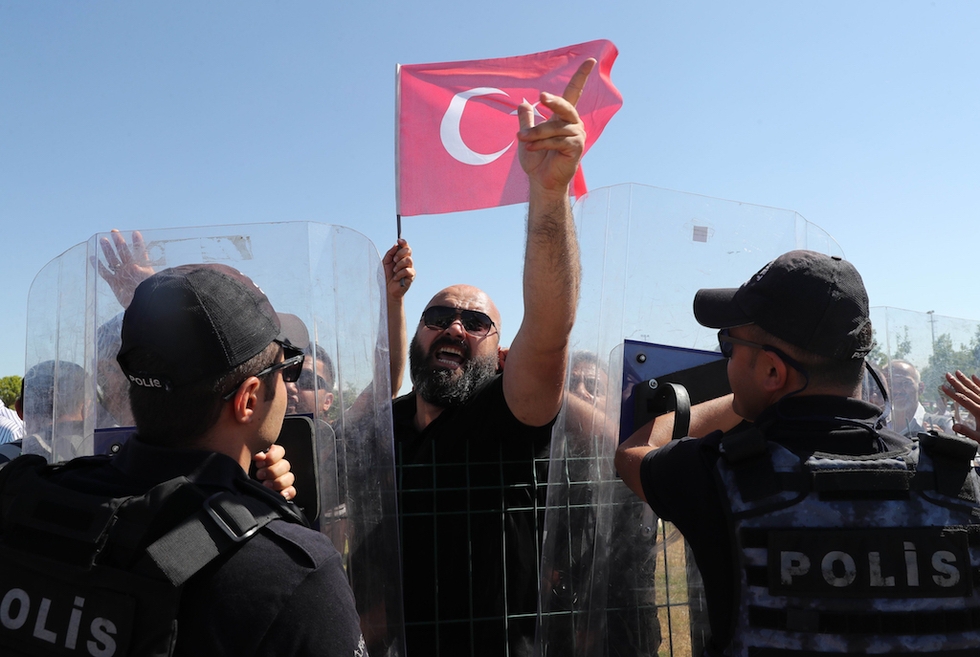Turkey condemns Germany for refusing to confirm it harbours coup attempt leader

Turkey has slammed Germany for refusing to confirm whether the country is harbouring the man suspected of organising the 15 July coup attempt last year.
Adil Oksuz, a civilian alleged supporter of US-based cleric Fethullah Gulen, has been missing since July 2016 after he was released from court following his arrest while trying to escape the Akinci air base on the night of the coup.
Oksuz is accused by Turkey of being the main conduit between Gulen and the military officers who carrying out the attempted putsch, which led to more than 200 deaths.
Although his whereabouts have been unconfirmed, Turkish media has repeatedly accused Germany of harbouring him.
On Saturday, Turkish Deputy Prime Minister Bekir Bozdag said that Germany had refused to answer a diplomatic note issued during the week inquiring whether Oksuz was in the country.
Turkey had demands but unfortunately a positive response could not be given to Turkey's expectations
- Bekir Bozdag, Turkish deputy prime minister
"Turkey had demands but unfortunately a positive response could not be given to Turkey's expectations," said Bozdag, speaking to reporters in Yozgat.
"In fact, they did not. On the issue of Adil Oksuz, a positive response has not been given so far."
Oksuz has been described as Gulen’s "air force imam" due to his alleged role as the contact between Gulenists in the air force and supporters in other areas.
He regularly travelled to the US to meet with Gulen, including a visit just two days before the 15 July coup attempt. The visit was since confirmed by Gulen himself, but he denied that this indicated his own involvement in the coup, describing it as "jumping to conclusions".
Others, including Gulen, have claimed that Oksuz had connections to Turkish intelligence, implying that the coup attempt was either staged or at least known about to the authorities prior to it happening.
'Enemies of Turkey'
Tensions have risen exponentially between Turkey and Germany since the coup attempt.
Turkey has long accused Germany of being a safe haven for "terrorist" groups including the Fethullahist Terror Organisation (FETO), the country's pejorative name for the Gulenists, the Kurdistan Workers' Party (PKK) and the Marxist-Leninist Revolutionary People's Liberation Party/Front (DHKP-C).
On Friday, Turkish President Recep Tayyip Erdogan urged ethnic Turks living in Germany not to vote for the ruling Christian Democrats (CDU) or any of the other larger parties.
"I tell all my kinsmen in Germany ... not to vote for them. Neither the Christian Democrats nor the SPD [Social Democratic Party] nor the Greens," he said.
"They are all enemies of Turkey."
He accused the SPD and CDU of playing a game of "the more you beat up Turkey, the more votes you get" during the election campaign.
"You need to support political parties there now which do not display enmity to Turkey."
Germany responded with outrage to Erdogan's comments, calling it an "unprecedented act of interference".
"We expect foreign governments to not interfere in our internal affairs," said Foreign Minister Sigmar Gabriel, on Twitter.
A number of German citizens have been detained and arrested in Turkey since the coup attempt.
Turkish German journalist Deniz Yucel, Istanbul correspondent of Die Welt, has been held in jail in Turkey since February ahead of trial on terror charges, while German journalist Mesale Tolu has been held on similar charges since May and activist Peter Steudtner was arrested in a July raid.
There are an estimated three million people of Turkish origin in Germany. Many of them came, or are the descendants of those who came, to West Germany as gastarbeiter (guest workers) from the 1960s, to make up for a postwar labour shortage.
Analysts say that about 1.2 million people of Turkish origin will have the right to vote in the September polls as German citizens.
In the past, Turkish-origin Germans have inclined to the left, with most voting for the SPD.
But Erdogan is also popular with Turks living in Germany, and 59 percent of the votes cast by Turkish citizens resident in Germany went to his ruling party in November 2015 parliamentary polls.
Middle East Eye propose une couverture et une analyse indépendantes et incomparables du Moyen-Orient, de l’Afrique du Nord et d’autres régions du monde. Pour en savoir plus sur la reprise de ce contenu et les frais qui s’appliquent, veuillez remplir ce formulaire [en anglais]. Pour en savoir plus sur MEE, cliquez ici [en anglais].




